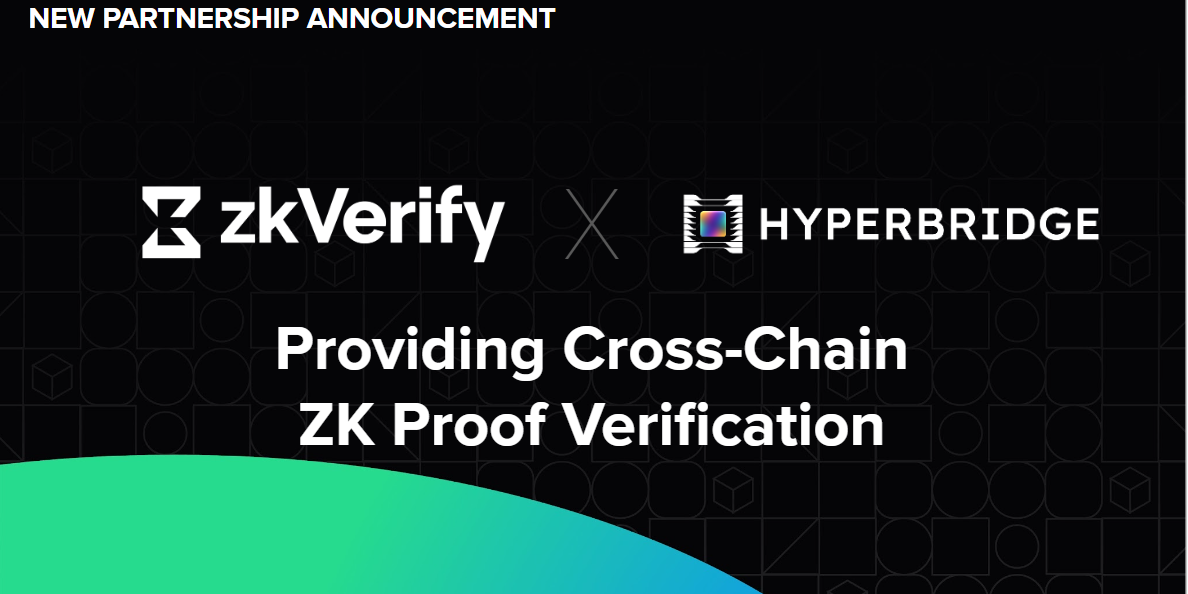zkVerify and Hyperbridge Join Forces to Provide Cross-Chain Zero-Knowledge Proof Verification

The zkVerify-Hyperbridge alliance opens up cost-effective zero-knowledge proof verification to developers of multiple different blockchain networks.
We are proud to announce a strategic alliance with Hyperbridge, a leading interoperability coprocessor. This collaboration will bring affordable and efficient zero-knowledge proof verification to multiple blockchain networks, marking a significant advancement in interoperability and scalability.
The initiative combines zkVerify's expertise in zero-knowledge proof verification with Hyperbridge's advanced cross-chain communication capabilities. By integrating these technologies, the two companies are addressing the growing demand for cost-effective, secure, and scalable blockchain solutions.
Making zero-knowledge proofs cheaper and more accessible across chains
At the core of this collaboration is the ability for zkVerify's proof verifications to be attested to on the chains supported by Hyperbridge's interoperability network. zkVerify's modular blockchain is designed to accept proofs, verify them, and store both the proof and verification result—offloading the computationally heavy process of verifying zero-knowledge proofs, reducing costs and improving scalability.
Hyperbridge's infrastructure will make verified proofs accessible across multiple blockchain networks by using its coprocessor architecture to aggregate interoperability proofs that can be cheaply verified on several chains. This significantly reduces the gas costs of on-chain proof verification, especially on networks like Ethereum where these operations are often prohibitively expensive. To do this, Hyperbridge is collaborating with zkVerify to create a messaging system that delivers proof verification results to other blockchains, enabling zkVerify to offer its services across many networks without requiring each one to implement complex verification processes.
From a macro cost perspective, the proof verification market is estimated to incur $100+ million in security expenses alone for zkRollups in 2024, extending to $1.5 billion by 2028 when including ZK applications, so solutions like zkVerify are much needed.
One of the key technical challenges addressed by this joint effort is the limitation imposed by Ethereum's standardization around the BN254 elliptic curve. By leveraging zkVerify's modular approach and Hyperbridge's expanding network of supported chains, the collaboration opens up possibilities for using a wider variety of cryptographic techniques in a multitude of different blockchain networks, potentially fostering innovation in zero-knowledge applications.
An ecosystem-wide benefit
The zkVerify-Hyperbridge initiative brings significant advantages to both end-users and the wider blockchain ecosystem. End-users will experience substantial reductions in transaction costs for zero-knowledge-enabled applications across more blockchains.
This partnership will enable zkVerify to offer cost-effective proof verification for zero-knowledge applications and rollups across multiple blockchain networks through Hyperbridge’s verifiable interoperability. Hyperbridge guarantees that accessing the result of verified proofs on zkVerify is secure and permissionless.
Rob Viglione, CEO of Horizen Labs, the developers behind zkVerify, said: "Zero-knowledge proofs are crucial for privacy and scalability, but they come with a high computational cost that can strain blockchain networks. With zkVerify, we’re aiming to relieve those pressures with a modular approach that shifts the verification process off the main chain, allowing other networks to maintain efficiency while still leveraging the benefits of zero-knowledge cryptography. The collaboration with Hyperbridge is about making this solution more broadly accessible, creating a more balanced, scalable ecosystem where chains can focus on their strengths while still supporting advanced cryptographic techniques."
Learn more about how zkVerify lowers the costs of zero-knowledge proofs here.
About Horizen Labs
Founded in 2019, Horizen Labs is a leading blockchain technology company specializing in zero-knowledge cryptography. Dedicated to scaling decentralized networks, Horizen Labs is elevating blockchain technology to unprecedented levels of efficiency. By focusing on developing next-gen, modular architectures, Horizen Labs is setting new standards for performance, security, and cost-effectiveness. Horizen Labs is trusted by industry giants such as Yuga Labs, Animoca Brands, and Offchain Labs. Additionally, it is the company engaged by the Ape DAO and Horizen DAO to help develop leading projects such as ApeChain and Horizen. Horizen Labs is a globally distributed team with offices in New York City and Milan.
For more information, visit https://horizenlabs.io.
About zkVerify
zkVerify is a modular blockchain dedicated to efficiently verifying zk proofs across diverse blockchain stacks. It enables any Layer 2 projects and dApp developers that utilize zero knowledge to scale rapidly and cost-effectively by drastically reducing proof verification costs without compromising network performance.
Designed for seamless integration with existing blockchain networks, zkVerify minimizes technical overhead and provides a developer-friendly environment. By simplifying the zk proof verification process and reducing associated costs, zkVerify enhances the performance of existing blockchain networks and unlocks new capabilities within the broader Web3 ecosystem.
For more information, visit https://zkverify.io
About HyperBridge
Hyperbridge is a cryptoeconomic coprocessor founded by core developers of Ethereum, Polkadot, and IBC for secure, verifiable interoperability powered by consensus and storage proofs. Hyperbridge is the HTTPS of blockchain interoperability, providing developers with onchain and off-chain SDKs for securely sending cross-chain messages (POST requests) and reading on-chain storage (GET requests).